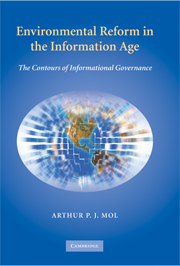Book contents
- Frontmatter
- Contents
- Tables, figures and boxes
- Preface
- Introduction: new frontiers of environmental governance
- Part I Theory
- Part II Praxis
- 5 Monitoring, surveillance and empowerment
- 6 Environmental state and information politics
- 7 Greening the networked economy
- 8 Environmental activism and advocacy
- 9 Media monopolies, digital democracy, cultural clashes
- 10 Information-poor environments: Asian tigers
- Part III Conclusion
- References
- Index
10 - Information-poor environments: Asian tigers
Published online by Cambridge University Press: 03 November 2009
- Frontmatter
- Contents
- Tables, figures and boxes
- Preface
- Introduction: new frontiers of environmental governance
- Part I Theory
- Part II Praxis
- 5 Monitoring, surveillance and empowerment
- 6 Environmental state and information politics
- 7 Greening the networked economy
- 8 Environmental activism and advocacy
- 9 Media monopolies, digital democracy, cultural clashes
- 10 Information-poor environments: Asian tigers
- Part III Conclusion
- References
- Index
Summary
China and Vietnam as information peripheries
Until this chapter, most of our analyses on the consequences of the information revolution for environmental governance have been focused on the more developed parts of the world, or on the global networks and flows that connect and integrate these developed parts of the world with specific nodes, places and practices in the lesser-developed countries and regions. It goes without saying, however, that information flows, informational processes and information access are not similar in all parts of the world and in all countries (cf. Zook, 2001; Gunaratne, 2002), resulting in geographical variations in the importance and relevance of informational governance on environment. The limited number of studies and analyses on how the information revolution and the Information Society affect environmental protection and governance have focused on the more developed parts of the world (see, for instance, the studies on the Information Society and sustainability by the EU). These are all information-rich environments, in which information generation, processing, access and use are relatively abundant; and – consequently – where informational dynamics can indeed play a significant role in environmental governance. But as this widespread availability of (environmental) information is not found everywhere and significant parts and spaces of the globe witness severe information shortages, what does informational governance look like in information-poor environments? Is informational governance at all a relevant category in such environments? In order to start gaining an insight in these questions we will look at two developing countries: China and Vietnam.
- Type
- Chapter
- Information
- Environmental Reform in the Information AgeThe Contours of Informational Governance, pp. 234 - 272Publisher: Cambridge University PressPrint publication year: 2008



